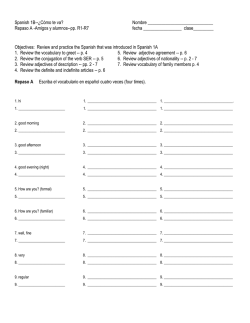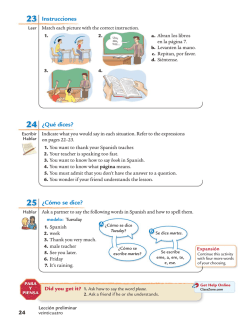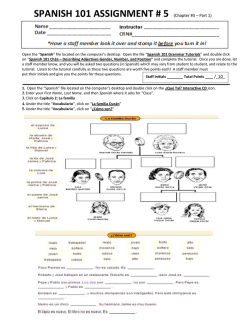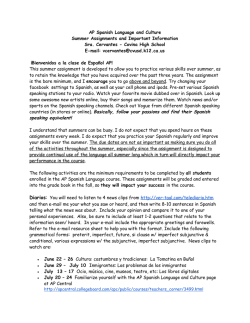
Class Grading Criteria
Spanish Tempe Preparatory Academy Class Participation Criteria Dr. Cardoso Categories to evaluate students’ participation in class: Use of Spanish, Group Interaction and Frequency of Participation/Volunteering. A maximum of 30 points can be earned per week. A deduction from the total number of points is made for unexcused tardiness and unexcused absences. After calculate the total for participation for the given week, deduct 3 points out of 30 from the total for each day student arrived late to class or unexcused absences. The following chart represents the points that may be earned in each of the different categories. 1 NUMBER OF POINTS 10 USE OF SPANISH GROUP INTERACTION Student used only Spanish while talking to the instructor and classmates. Student used Spanish about 90% of the time. Student participated actively by listening, speaking, and paying attention while in groups. Student also initiated many conversations and discussions. Student was an active listener and paid attention. Student often initiated conversations and discussions. Student used Spanish about 80% of the time. Student used Spanish about 70% of the time. Student was an active listener and student occasionally contributed to the conversations. Student did not always listen to what was going on around him and student occasionally contributed to the conversations. Student used Spanish about 60% of the time. Student used Spanish about 50% of the time. Student Student Student Student 4 Student used Spanish about 40% of the time. 0–3 Student rarely used Spanish, but used English. Student rarely paid attention, Student was not interested in the activities, and Student did something else (like read, sleep, day-dream, or do other homework). Student was not interested during group work and student distracted others in his/her group and/or other groups by his/her actions. 9 8 7 6 5 1 Adapted from SILC, Arizona State University did not always pay attention to what was going on and only contributed as much as others. rarely paid attention to what was going on and was not very interested in the activities. FREQUENCY OF PARTICIPATION/ VOLUNTEERING Student always participated and volunteered for most activities. Student participated as frequently as possible and volunteered for most activities. Student often participated and generally volunteered. Student participated occasionally, but could have volunteered more. The instructor had to call on him/her to speak aloud in class. Student participated somewhat and volunteered occasionally. Student participated somewhat and hardly ever volunteered. The instructor had to call on him/her to speak aloud in class. Student rarely participated and hardly ever volunteered. Student could not even answer when called upon. Student very rarely or never participated and Student never volunteered. Student also read the newspaper, slept, day-dreamed, and /or did other homework during class. Spanish Tempe Preparatory Academy Class Participation Criteria Grade ________ Student’s Name _______________________________ ATTENDANCE Date Dates Absent (Unexcused Absences) Week 1 Week 2 Week 3 Week 4 Dr. Cardoso TEACHER’S COMMENTS PARTICIPATION Dates Late (Unexcused Tardies) Use of Spanish (10 points) Group Interaction (10 points) Frequency of Participation/ Volunteering (10 points) Total for week Total with deductions /30 Comments HOW TO WRITE A COMPOSITION 1 It is generally not effective to write the composition in English and then translate it. You will make it harder on yourself and will end up trying to say things you have not yet learned. The composition topics are geared to complement the vocabulary and structures learned, so there should be no problem fulfilling the task of the composition using only what you have learned in class. That is why it is important to have completed all the workbook exercises for the chapter under consideration before writing your composition. Read the guidelines for writing in your textbook. The strategies and techniques outlined there will help you write your composition. WORK METHOD 1. Take notes on your ideas: • Main ideas • Supporting ideas • Vocabulary preparation - Brainstorm some of the words you might use related to the topic ahead of time. Find them in your dictionary, cross-reference them, and make a list. (Then, when you begin to write, you will be able to put in words as you need them). 2. Organize your notes in a clear and logical manner: Don't forget to organize your composition with: • an introduction: identify the topic about which you are writing; give a summary of your arguments. • a development of your ideas: put different ideas in different paragraphs; identify each idea clearly; give all necessary examples and arguments (if appropriate). • a conclusion: give the conclusion you reached after reasoning through the development; hint: the conclusion is not just a repetition of the ideas in the introduction. • a title: choose a title that is clear; choose a title that gives some indication of the direction or focus of the composition. 1 From SILC, Arizona State University 3. Write the first draft at least 3 days before peer editing day: • Use your notes • Don't stop to look up a word you don't know or to correct your grammar. You will do those things when you review your completed rough draft. • Mark your questions about vocabulary and grammar with a question mark (?). • Then, review what you have written. • State your ideas as clearly as possible; be sure the organization is logical; look up words you don't know; correct grammar errors that you find. • Using a dictionary: For every word that you look up in the dictionary, consult the dictionary from two points of view, that is, look up the word in the English/Spanish section and check it in the Spanish/English section. The meaning of a word often depends on the context in which you use it. For example, the word 'party' has a different meaning in these two sentences: “I went to the party last night.” “He belongs to the Republican party.” 4. Set this draft aside for one or two days: This will give you the opportunity to revise and more easily identify mistakes, answer the questions you had, and add/delete some information. 5. Review, revise and rewrite your composition: Pay attention to: • Logic of ideas and organization • Clarity of presentation • Accuracy of grammar and vocabulary • Pay attention to the five main areas in which your instructor will grade you. 6. Type the draft that you are going to bring to class for peer editing: After your composition has been edited/reviewed by a classmate, consider the comments/suggestions and revise it if necessary to hand in the day it is due. Spanish Tempe Preparatory Academy COMPOSITION: ERROR AWARENESS SHEET 1 V The verb form is incorrect (tense, conjugation, use of infinitive, verb agreement, etc.) UN No such word or construction exists in Spanish. It might be a false cognate. NS A completely new structure is needed to convey the proper meaning NAG Noun-adjective, article-noun agreements are faulty in some way AP Adjective placement incorrect PREP Preposition wrong or missing (a, de, desde, con, por, para, contra, encima, debajo, antes de, después de...) ART Article is missing or should be deleted ? A question mark adjacent to a word, clause, or sentence that is UNDERLINED indicates the reader could make no sense of the passage whatsoever. WO Any error involving word order WW Wrong word. A lexical or dictionary error // A word is not necessary and must be deleted Word missing AP Adjective placement incorrect Sp Spelling error, accent missing or wrong Punct Punctuation mistake Cap Capital letter incorrect or missing COMPOSITION: ERROR AWARENESS SHEET V The verb form is incorrect (tense, conjugation, use of infinitive, verb agreement, etc.) UN No such word or construction exists in Spanish. It might be a false cognate. NS A completely new structure is needed to convey the proper meaning NAG Noun-adjective, article-noun agreements are faulty in some way AP Adjective placement incorrect PREP Preposition wrong or missing (a, de, desde, con, por, para, contra, encima, debajo, antes de, después de...) ART Article is missing or should be deleted ? A question mark adjacent to a word, clause, or sentence that is UNDERLINED indicates the reader could make no sense of the passage whatsoever. WO Any error involving word order WW Wrong word. A lexical or dictionary error // A word is not necessary and must be deleted Word missing AP Adjective placement incorrect Sp Spelling error, accent missing or wrong Punct Punctuation mistake Cap Capital letter incorrect or missing 1 From SILC, Arizona State University Jaime Cardoso Después de hablando,... Después de hablar,… Voy a fiestar. Voy a divertirme. Es frío. Hace frío. La hojas seco. Las hojas secas. La roja pelota. La pelota roja. Voy la universidad. Voy a la universidad Compré pavo. Compré un pavo. Vi la ayer. La vi ayer. La fiesta política. El partido político. Busco por mi cartera. Busco mi cartera Voy estudiar. Voy a estudiar. Los hombres grandes. Los grandes hombres. Corason. corazón. José Ana y Roberto van. José, Ana y Roberto van. Mexicano. mexicano Después de hablando,... Después de hablar,… Voy a fiestar. Voy a divertirme. Es frío. Hace frío. La hojas seco. Las hojas secas. La roja pelota. La pelota roja. Voy la universidad. Voy a la universidad Compré pavo. Compré un pavo. Vi la ayer. La vi ayer. La fiesta política. El partido político. Busco por mi cartera. Busco mi cartera Voy estudiar. Voy a estudiar. Los hombres grandes. Los grandes hombres. Corason. corazón. José Ana y Roberto van. José, Ana y Roberto van. Mexicano. mexicano Spanish Tempe Preparatory Academy Dr. Cardoso Oral Exam – Evaluation Sheet 1 Nombre del estudiante: ____________________________ Fecha: __________________ # of points Content/information conveyed/interaction Comprehensibility/ Pronunciation Fluency Vocabulary Grammar 18-20 Contributes relevant information. Develops ideas by speaking in paragraph form. Consistent performance across entire activity. Is pivotal in maintaining interaction. Consistently responds to others’ comments/ideas. Stays all in Spanish and comprehensibility not affected by errors. Speech natural and continuous; no unnatural pauses Demonstrates extensive vocabulary. Almost always uses appropriate word or expression. Rarely if ever searches for words. Uses appropriate syntax and morphological form. Controls most structures used (consistently high performance). Few error types. 16-17 B Contributes relevant information. Some development of ideas but tends to use single sentences. Not so consistent performance across the entire activity. Helps maintain/initiates interaction. Often responds to others’ ideas. Stays all in Spanish but comprehensibility sometimes affected. Speech generally natural and continuous; only slight stumbling or unnatural pauses Demonstrates a large vocabulary. Almost always uses appropriate word or expression. Seldom misses or searches for words. 14-15 C Contributes adequate information. Not much development of ideas. Almost always speaks in single sentences. Rarely helps maintain the interaction OR dominates the interaction. Contributes little information or information lacks substance, is superficial, inappropriate, or irrelevant. Speaks in single sentences or in short phrases. Almost never helps maintain the interaction. Sometimes uses English words or phrases and/or comprehensibility is frequently affected. Some definite stumbling, but manages to rephrase or continue Overuse of English and/or comprehensibility is seriously affected. Speech frequently hesitant and jerky; sentences may be left uncompleted Demonstrates moderate size vocabulary. Sometimes invents words. Frequently misses or searches for words or expression. Demonstrates small vocabulary. Overuses invented words or expression. Vocabulary limits interaction. Uses mostly appropriate syntax and morphological forms. Controls some structures used (some inconsistency in performance). Errors are infrequent Uses inappropriate syntax and morphological forms. Controls very few structures. Errors are frequent. Uses inappropriate syntax and morphological forms. Control of structures is an issue. Errors dominate. A 12-13 D Total 1 Adapted from SILC, Arizona State University Student total Spanish Tempe Preparatory Academy Dr. Cardoso Evaluación de presentaciones orales Nombre: ____________________ Fecha: ________ Tema presentado ____________________ 1. Uso de español (60%) Fluency______ (15) Vocabulary ______ (15) Grammar _________(15) Comprehensibility________(15) 2. Respuesta a preguntas (15%) Fluency______(4) Vocabulary ______(3) Grammar _________(4) Listening Comprehension______(4) 3. Calidad de la presentación (25%) Content _________(8) Creativity/use of props________(8) Effort __________(9) Calificación final: ________/100 Comentarios: _________________________________________________________________ Spanish Tempe Preparatory Academy Composition/Essay Evaluation Name: _________________________________ Focus/Content: ____ /20 Organization: ____ /20 Grammar: ____ /25 Vocabulary: ____ /20 Conventions: ____ /15 Total: ____/100 Date: ___________________ Dr. Cardoso Tempe Preparatory Academy Compositions/Essays Español Name _________________________________ Dr. Cardoso Grade _______ First Draft (date)_____________ Final version (date) ____________ Content 0-20 ________ Content 0-20 ________ Organization 0-15 ________ Organization 0-15 ________ Grammar 0-30 ________ Grammar 0-30 ________ Vocabulary 0-25 ________ Vocabulary 0-25 ________ Conventions 0-10 Conventions 0-10 Total: 100 ________ ________ Total: 1st Draft 100 ________ ________ ___________x .6 _________ Final version ___________ x .4 ________ Final grade: ______________
© Copyright 2026



